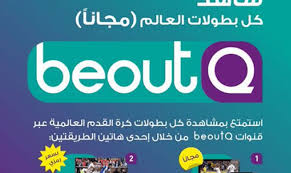By Paul Nicholson
July 16 – Saudi Arabia quickly responded to FIFA’s statement that it was to take legal action in Saudi Arabia against pirate television channel beoutQ that broadcast every match of the World Cup in Russia illegally to the kingdom, saying that it welcomed the FIFA action.
Saudi Arabia, which has gone to great lengths to attempt to distance the country from the pirate broadcaster, said the FIFA action “will supplement the relentless efforts by the KSA Ministry of Commerce and Investment in combatting beoutQ’s activities and beIN’s illegal broadcasting within the country. These efforts and others reinforce the Government of Saudi Arabia’s devotion to protecting intellectual property (IP) rights within KSA.”
The ministry does not define what those “relentless efforts” are, but it has previously said that it has confiscated 12,000 decoders in the country of 32 million people.
They have been watching the World Cup via Qatar-based beIN Sports’ pirated signal rebroadcast via the Riyadh, Saudi Arabia-based, Arabsat satellite on the beoutQ channel. Arabsat is more than 30% owned by the Kingdom of Saudi Arabia and has signed up to various international copyright and anti-copyright theft agreements.
The Saudi’s claim “irresponsible media reports have falsely and unfairly connected KSA with beoutQ’s piracy.”
The geo-politics of the region where Saudi Arabia is leading the economic blockade of Qatar, has rapidly escalated this copyright dispute into a high profile microcosm of the larger dispute with Saudi Arabia accusing beIN Sport of “maliciously orchestrat(ing) a media smear campaign against KSA.” Going as far as to
The Saudis have banned beIN Sports owner Al Jazeera because it says it “is Qatar’s principal media arm for supporting terrorism and promoting instability in the region.” It has done this by blocking the signal into the region. However it has not blocked the beoutQ pirate signal.
The Saudi ministry contradicts itself in its press statement on the one hand recognising that beoutQ is “illegal piracy”, but later saying “beIN Sports purports to be the exclusive licensee of FIFA and other content owners for KSA and other MENA region countries.”
There is no doubt that beIN Sports is the legal rightsholder – as FIFA, F1, UEFA, world tennis bodies and various other rights holders have repeatedly verified. What beIN Sports doesn’t have is the license to broadcast in the country that the Saudis withdrew.
What that effectively means is that the Saudis withdrew the opportunity for its citizens to watch the World Cup and other sports legally. Sports fans were then forced to turn to the pirate beoutQ to watch matches.
The dispute is local but it has important ramifications in a wider perspective for sports rights owners who have a responsibility to ensure their rights are protected against piracy and need to be seen to be doing so with all the means at their disposal. Failure to protect rights significantly devalues those rights in the broadcast marketplace. Ultimately that means that less money will make its way to rights owners and into the funding of their sports in what is an increasingly ‘disrupted’ broadcast marketplace where rights sellers are finding it increasingly hard to maintain value – as witnessed by the recent deals for the Premier League and LaLiga.
Many rights owners will be nervously anticipating the difficult and inevitable ‘money back’ conversations that failure to protect their rights leads to.
Contact the writer of this story at moc.l1745273499labto1745273499ofdlr1745273499owedi1745273499sni@n1745273499osloh1745273499cin.l1745273499uap1745273499

